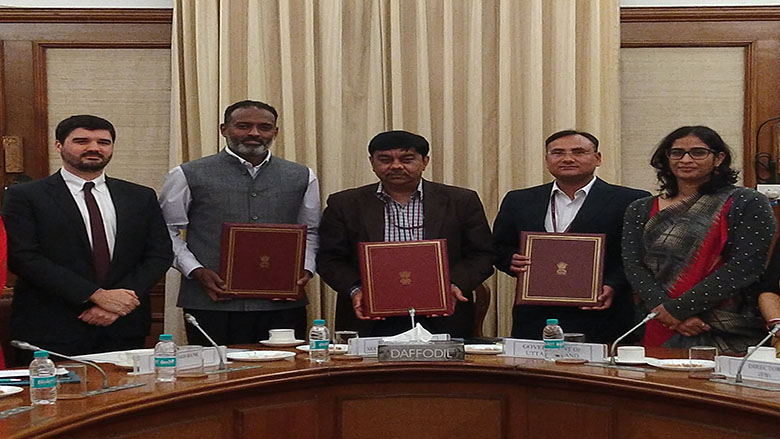New Delhi, March 5, 2019 – The World Bank, Government of India and Government of Uttarakhand (GoUK) signed a $96 million agreement today to provide additional funds to the state in its post disaster recovery plans, ongoing since the floods of 2013, as well as strengthen its capacity for disaster risk management.
The World Bank, through the Uttarakhand Disaster Recovery Project, has been supporting the state government since 2014 to restore housing and rural connectivity, and to build resilience of communities. So far, .
(SDRF). The project will also help to increase the technical capacity of the state entities to respond promptly and more effectively to such crises in the future.
“India is vulnerable, in varying degrees, to many natural as well as man-made disasters. The Government of India is committed to develop a holistic, proactive, multi-disaster-oriented strategy, using technology effectively to build a safe and disaster resilient India,” said Sameer Kumar Khare, Additional Secretary, Department of Economic Affairs, Ministry of Finance. “The Uttarakhand Disaster Recovery Project has been delivering on these objectives and the additional finance will help expand its impact,” he added.
The Loan Agreement was signed by Sameer Kumar Khare, Additional Secretary, Department of Economic Affairs, Ministry of Finance, on behalf of the Government of India; Amit Negi, Secretary, Finance and Disaster Management, Government of Uttarakhand and Program Director, Uttarakhand Disaster Recovery Project on behalf of the GoUK; and Hisham Abdo, Acting Country Director, World Bank India, on behalf of the World Bank
“Natural disasters cost the country an average of $9.8 billion annually. The Government of India has made great strides in moving from reactive emergency response to proactively implement disaster preparedness and risk reduction initiatives. We are committed to supporting Uttarakhand in its efforts towards a resilient recovery and rehabilitation,” said Hisham Abdo, Acting Country Director, World Bank
In June 2013, a heavy deluge caused devastating floods and landslides in the Himalayan state of Uttarakhand. The disaster, the worst of its kind since the 2003 tsunami, hit more than 4,200 villages, damaged 2,500 houses, and killed 4,000 people.
The project has helped in strengthening the state’s disaster risk management capacity which has led to enhanced investment in long-term resilience through policies and institutions. The capacity of the SDRF, meant to be at the forefront during emergency situations of the state, has also been significantly strengthened and it has so far conducted over 250 operations rescuing over 3,500 people, during the high pilgrimage season.
The extent and pace of recovery since 2013 has been significant, however, connectivity remains a challenge. Landslides and river bank erosion are common and continue to disrupt movement and cause accidents, affecting the livelihood and access to services of the local community. In the aftermath of the floods, the number of tourists visiting the state dropped from over 2.5 million in 2012 to less than 350,000 in 2014.
“While the impacts of climate change in future disasters remain uncertain, efforts to ensure that the state has additional capabilities and resilient infrastructure to reduce the potential damages and recover more quickly from disasters will translate into important beneficial ripple effects on the state’s economy and livelihoods in the long term,” said Ignacio Urrutia, Task Team Leader for the Project.
The $96 million loan from the International Bank for Reconstruction and Development (IBRD), has a 5-year grace period, and a final maturity of 15 years.

